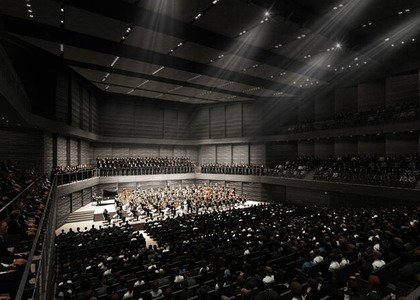> [Archived] Events

The oratorio "Elias" op.70 by Felix Mendelssohn Bartholdy, in direct transmission from the new hall "Isarphilharmonie" in Munich
The oratorio "Elias" op.70 by Felix Mendelssohn Bartholdy, in direct transmission from the new hall "Isarphilharmonie" in Munich. Performers - Bavarian Broadcasting Choir and Orchestra, conducted by Duncan Ward. Soloists: soprano Maria Bengtsson, viola WiebkeLehmkuhl, tenor Maximilian Schmitt and bass Georg Zeppenfeld.
A last-minute change brings the British Duncan Ward to Munich, instead of Kirill Petrenko, to conduct the monumental Oratorio "Elias" by Felix Mendelssohn Bartholdy, two evenings in a row, on October 13th and 14th at the "Isarphilharmonie". It is the newest concert hall in Munich, with multiple functions, celebrating one year since its inaugurationat the beginning of October - new headquarters for the Choir and Orchestra of the Bavarian Radio Broadcasting, which thus enjoys the most optimal and modern acoustic and architectural qualities, especially designed to provide audiences with benchmark sound experiences. It is what is expected from this vocal-symphonic concert, which trains huge forces. The score was designed by Felix Mendelssohn for 400 musicians - soloists, choir and orchestra, evoking moments from the life of the prophet Elijah the Tesvitean (Elijahu, Elias) in an oratorio modeled on similar works created by Bach and Handel, the authors whom the romanticcomposer admired and respected with unparalleled devotion, according to historical sources.
An extremely difficult undertaking - the interpretation of this oratorio, the most famous of Mendelssohn's creations. I say this because the action runs for about 120 minutes, a challenge for any ensemble in this context, involving extensive inner support and obviously long experience on the part of the performers, fully confirmed in this case. There is also a disc version from 2011 of the oratorio "Elias" by Felix Mendelssohn Bartholdy in the same performance - Bavarian Broadcasting Choir and Orchestra, but conducted by Wolfgang Sawalish, with baritone Michael Volle in the lead role.
This time, the members of these famous ensembles will perform under the baton of a young conductor in full affirmation, completely versatile in a positive sense due to the openness he has. Duncan Ward distinguished himself by conducting early music ensembles ("Balthasar Neumann", "Insula"), chamber orchestras such as the Deutsche Kammerphilharmonie in Bremen, large symphony orchestras (London, BBC, Barcelona, Orchester de Paris), or Ensemble Intercontemporain. He made his debut this year at the Metropolitan Opera in New York, in "The Magic Flute" by Mozart, and opened the Salzburg Festival at the lectern of the Mozarteum Orchestra. The mainstream press raved about Duncan Ward's directing, with "fierce dynamism and electrifying precision." In addition, he has this availability to respond to momentary changes. And he conducted the Choir and Orchestra of the Bavarian Broadcasting in place of Tugan Sokhievlast year.
Four soloists were chosen for this new version of the Oratorio "Elias" by Mendelssohn - in the main role the bass Georg Zeppenfeld, an artist who mainly interprets the Wagnerian repertoire, but also Mozart, Verdi, Tchaikovsky, Donizetti on the important opera stages of the world, having often appeared in concerts in the Oratorio "Paradies und Peri" by Schumann, or in the 9th Symphony by Ludwig van Beethoven at the Salzburg Festival. He is joined by the Swedish soprano Maria Bengtsson, WiebkeLehmkuhl - alto and tenor Maximilian Schmitt, each playing two or three roles, because Mendelssohn originally envisioned eight soloists, along with the choir and the large romantic orchestra.
All these artists propose a foray into the pages of the Old Testament. For "Elias", the librettist Julius Schubring was inspired by the Book of Kings, Jeremiah, Deuteronomy, Exodus and the Psalms of David, a structure on which Felix Mendelssohn Bartholdy created a musical scenario typical of the first decades of Romanticism, with a beautifully arched melody, with moments of great drama following the course of events - the confrontation with the followers of the god Baal, the resurrection of the widow's son, the coming of the rains following the prayers of the prophet Elijah, his persecution by Queen Jezebel, his retreat to the desert, his return as a prophet of the Lord and his ascension to heaven in - a chariot of fire.
It is a monumental construction, crossed by arias, recitatives, choirs that symbolize the voice of the Israelites, (also having the role of commentator according to the ancient model), along with innovative formulations, recitatives accompanied by the choir, trios, vocal quartets. The first audition of the Oratorio "Elias" was conducted by Felix Mendelssohn Bartholdy in 1846 at the Birmingham Festival in English, following a series of revisions, even if the success was huge. This is because the author wanted to achieve perfection. Otherwise, nowadays this revised version is presented in concerts or on disc, in the evening of October 14th, being offered to us through the European Radio Union, live from the "Isarphilharmonie" in Munich.
Translated by Medeea Alexandra Stan,
University of Bucharest, Faculty of Foreign Languages and Literatures, MTTLC, year II
Corrected by Silvia Petrescu














